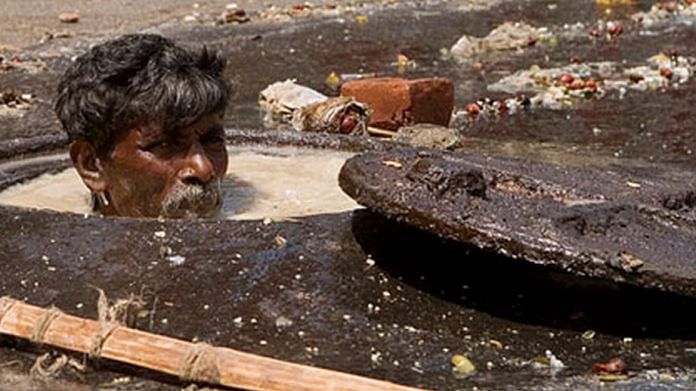India’s urban areas produce 120,000 tonnes of faecal sludge on a daily basis, but an estimated two-thirds of the country’s households with toilets aren’t connected to the sewer system. As such, according to the Centre for Science and Environment, 60% of this human waste is dumped in open water and on open land – contaminating drinking water and harming other food sources.
Much of the sanitation conversation has focused on practices like open defecation or the absence of functioning toilets, but we need to recognize the complicated and necessary value chain that drives the sanitation system. Specifically, we need to move from a discussion that is purely focused on the generation of faecal sludge to one that acknowledges how containment, disposal and end-use are equally, if not more, necessary.
Facing the challenges to a healthy and sustainable sanitation system
Current sanitation services are not keeping up with the amount of faecal sludge generated in Indian cities. Private actors are responding and attempting to fill this capacity gap, but they are left largely unmonitored, resulting in irregular and illegal dumping of waste.
A market exists to distribute and allocate resources in an efficient manner, but socializing and commercializing the need for sanitation services is no easy feat. Creating a market for sanitation requires deeper reflection on the individual capabilities and weaknesses of the public and private sectors, while also acknowledging the fundamental necessity for partnership between the two.
Yet, the reality is that market failures exist. There are cities that lack coordinated urban planning and remain disconnected from efficient sewage systems. The implementation of policies for disposal and waste is often incoherent and leads to contamination of the natural environment. There are also cities where administrators cannot track how much waste is being collected and transported by the septic tank operator because of poor data transparency.
This Indian city has an innovative way to end sewage being dumped in the open
Saving lives and cleaning up the environment.? Read more: https://wef.ch/2mkGtQa Amitabh Bachchan
World Economic Forum यांनी वर पोस्ट केले सोमवार, ३० सप्टेंबर, २०१९
These are some of the major roadblocks to accessing high-quality and sufficient sanitation services for everyday urban residents in India. Instead, India needs a sanitation market in which Urban Local Bodies (ULBs) in cities can give septic tank operators access to all treatment plants, where tank operators can be trained and offered formal employment opportunities to provide higher quality services – and where those at the base of the pyramid, the household, are able to easily request their tanks be cleaned.
What are the next steps?
Building such a market requires deep and creative thinking about the different needs of policy administrators, households and the entrepreneurial operators taking care of waste on a daily basis. Moreover, it needs constant collaboration with government, who must feed real-time faecal sludge disposal data into city-level regulations. Establishing the right behavioural norms will require active participation from every Indian citizen. Communities must realize that their need to get rid of waste produced by households and the need for wider management of faecal sludge are both urgent.
Financing the requirements of these different stakeholders is also a real and urgent need. Not only will urban local bodies have to devise innovative ways to fund their community and public sanitation facilities, but private tank operators will need to be paid in an efficient manner. The sustainable and scalable funding of rapidly developing technologies that convert faecal sludge to more useful resources, such as energy, must also be considered. Pricing faecal sludge will enable companies managing these technologies to compensate private tank operators who manage and purchase waste from the household.
In Patna, Bihar, Population Services International (PSI) has run a pilot of this kind. Funded by the Bill and Melinda Gates Foundation and Grand Challenges Canada, the pilot seeks to transform the municipal sewage treatment environment. To date, close to 80,000 residents in Patna have benefitted from this pilot with 25% less faecal sludge contaminating open areas and 5 million litres of faecal sludge disposed of at a treatment plant.
To take this pilot to the next level, PSI is partnering with the Forum of Young Global Leaders over the next two years to scale the initiative across 10 Tier-2 cities in India. Taking this pilot to other cities in the country, in large states like Uttar Pradesh and Andhra Pradesh, will allow for the gradual development of a viable marketplace for faecal sludge. By disrupting the bad habits at play, this initiative will inevitably allow for increased legitimacy, transparency and natural collaboration between the private and public sectors.
This article was first published on the website of the World Economic Forum.
Also read: Converting waste to energy is great, but also disastrous if done as here in Delhi




With 1.2 lakh tonne faecal sludge everyday, India needs a market for human waste says the Print.Modi ghodi annumnces millions took a dip in the Ganges with human wastr floating all around them. Ugh, will thisc ountry ever develop with such Kumbh Mrla.
In Singapore, human waste is processed and used as a feed to piggeries that ,in turn, become food for human in the form of ham, bacon etc.
We never discussed issues like open defecation & its I’ll effects. The herculean task too 70years of no action, no discussion for PM Modi to clear the mess in 5 years.
The discussion now moves on to human faecal matter recycling. This too wont take another 70 years hereon. A solution will soon be made available with this article being brought to notice of GOI.